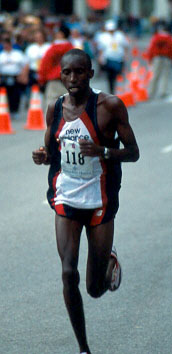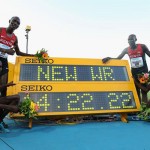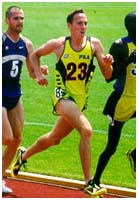“Beeeeeep. Beeeeep. Beeeeep.”
The people in Nike’s sports watch department have succeeded. They have created the most annoying alarm tone ever, and for the last five minutes it’s been an unwelcome intruder into my REM sleep.
I woke with the second or third beep, so why is the watch’s owner, the person it is intended to wake, still sleeping peacefully only inches from the screeching object?
 Probably because he knows, in his sleeping subconscious, that waking up means training, and training today is a two-hour long run over the rolling hills of Pennsylvania’s Valley Forge National Park.
Probably because he knows, in his sleeping subconscious, that waking up means training, and training today is a two-hour long run over the rolling hills of Pennsylvania’s Valley Forge National Park.
I’m just about to join the watch with some screaming of my own when the figure beneath the blanket stirs, and with his normal burst of humor declares, “Jay, why you make watch wake me up? You is bad roommate. Now we has bad training because of your watch.”
Of course it’s 4:30 in the morning, and my watch won’t go off for another three hours. The only watches I want to hear right now are those in my dreams, but such is life on the inside – you get the whole experience, annoying alarms and all.
My roommate, Gabriel Muchiri, is just one of a number of international athletes managed by Elite Sports Management International or ESMI, a West Chester, Pennsylvania agency whose clients include Muchiri, 3:49 miler Leonard Mucheru and Asmae Leghzaoui, holder of the women’s world records for 8k and 10k.
In Kenya, the athletes come from a variety of villages, homes, and backgrounds, but here in America they live as one big family. Here home is Cheston House; a nineteenth-century apartment house, where ESMI athletes occupy several of the apartments. During the week this house serves as a the athletes’ base of operations as they prepare for weekend excursions to all manner of races, from local road races to track events to major happenings such as Atlanta’s Peachtree Road Race or the New York City Marathon.
I too have come to Cheston House to train. Only for me I have come to train my mind – to learn more about the inside world of Kenyan running, and to improve my grasp of Kiswahili, the second language of East Africa, before I return to Kenya in November of this year to work again with Chepkero Athletics Club.
“Muchiri, would you please shut that stupid watch off.”
“You no like Beeeeep, Beeeeeep, Beeeeeep?”
Gabriel joins the watch in sounding off, and I give up and roll over to face the wall. The watch and Gabriel both stop their beeping, and he goes through the morning ritual of preparing for his run.
His watch not withstanding, Gabriel is a very good roommate, and he’s gone out of his way to make me, the mzungu or white man, feel very welcome in a house full of Kenyans. In many ways in fact the athletes show me the ultimate in hospitality by acting like I’m not here at all. I am neither visitor nor intruder. I am simply another housemate, and as such I am afforded a rare and telling glimpse into the runners’ day-to-day routines.
It is my hope that you, the Time-to-Run readers, will enjoy a similar experience. In the coming months you will join the Kenyan athletes as they live, train, and race in their home away from home – only you won’t have to listen to Gabriel’s alarm every morning. To this end I solicit your feedback, questions and input. Have specific areas you’d like to know more about? Just let me know and I’ll see what I can do. Otherwise, I hope you enjoy reading the column.



























Speak Your Mind